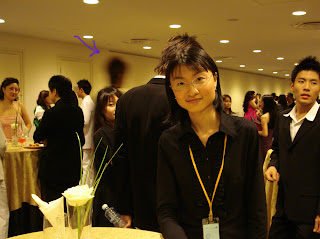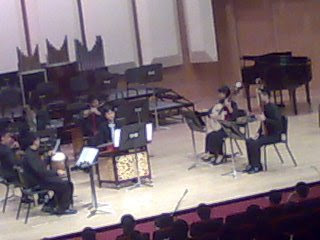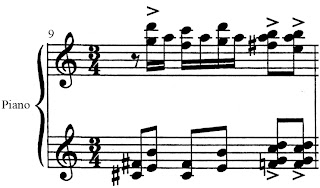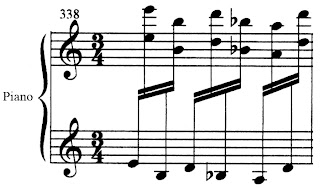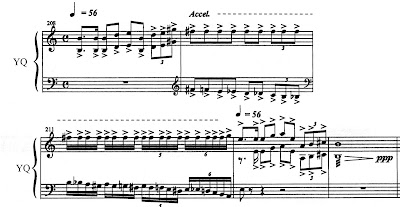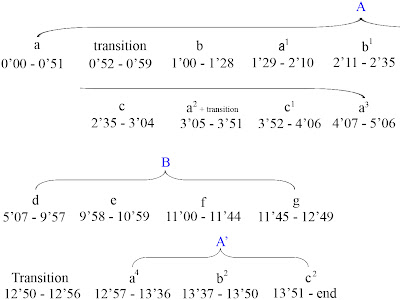since watching that video i've been sighing till now... hope she wont ask to see it.. haiz
hello.. thx for visiting this little blog that is primarily set up for my musical musings and thoughts. So do feel free to leave comments or just drop a note to say hi :D (so that this page won't seem so barren..)
Sunday, December 30, 2007
so awful i cant imagine
since watching that video i've been sighing till now... hope she wont ask to see it.. haiz
Tuesday, December 25, 2007
x'mas practice
Friday, December 14, 2007
so many things.. so little time
Sunday, December 02, 2007
the moment
Friday, November 30, 2007
Just in time for Festive season!
http://video.google.com/videoplay?docid=-1522104883855814582&q=Dick+Lee&total=580&start=20&num=10&so=0&type=search&plindex=2
Wednesday, November 28, 2007
my new basketball

Wednesday, November 21, 2007
Calculus is OVER!
Friday, November 16, 2007
1 paper down!
Thursday, October 25, 2007
recording for arrangement
Workplace for the past 2 wks :D
Friday, October 12, 2007
Our one and only recorder video
should have recorded more right..haha.. pardon those 'shaky' moments
Thursday, October 11, 2007
Interesting photos
Sunday, October 07, 2007
Tuesday, October 02, 2007
speaking in a math/music language..haha
There is this chinese mathematician who went to buy some tidbits. Apparently it was something unique and he wanted to leave some for his friend. But his friend was not in, so he left a message: Let you try (sq. root 2)
get what he mean?
hint: sq. root 2 is approx. 1.414
so, translating the message into chinese it becomes 让你尝一点试一试
And this one is hot from the oven (by me)
When someone says he wants to remain in D major, what does it mean?
hint: try translating D major into chinese
get it? :D
days marked by deadlines
Saturday, September 01, 2007
final showdown
Just discovered a few days ago that our music director is actually a g.p... wow!! Given his accomplishments in the pop music scene, one would have thought he's full time into music but no... No wonder he has such great personality... haha my role model!
I must say I have grown to like Dick's music.. they are just so amazing in that they're able to evoke emotions so varying and extreme and his ability to compose music of so different genres. They search your soul and you just succumb to them, especially the power that emanate those texts... At least he made me learn to enjoy pop now
and now for the critical part.. I feel that although we have a mixture of instruments, most of the time indian and chinese instruments are of lesser importance compared to those electronic ones. I think we can do without ethnic insts., but not those electronic and brass ones. Last wk Nat. just complained that she has to keep (re)tuning the inst. for just a few gliss.. basically what she do throughout most pieces is that 'signature guzheng' gliss. Yep and that's all i could hear from gz.. haha think i have to be thankful that i'm not given parts like that.. at least i play broken chords and at times important rhythmic figures.. though i wish i could be given some melodic role. As for yq and dizi i heard from some audiences that the sound projection and quality weren't that good due to amplification, i think perhaps yq can't use those contact mikes cos the timbre has changed through the amplification.
scene before rehearsals
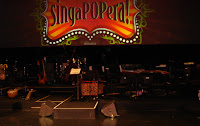
shouldnt upload photos with faces here to protect their identity :D
some photos i took with 'big' ppl are rather shocking, the problem is that they look too nice (too suspicious.. to the eye of a second party.. haha so none shld be shown)
Saturday, August 25, 2007
Tuesday, August 21, 2007
weary
2 weeks of 'hell'
Today: lessons 1230-6.30pm, then rehearsals 7-10pm
Thurs: rehearsals 7-10pm
Sat: 12-8pm
Sun: 12-6pm
Next Mon: Algebra II quiz
Tue: AED 201 presentation
Wed: rehearsals 2-11pm
Thur: rehearsals 4-11pm
Fri & Sat: Concert
Absolutely no time to do and revise sch work.. I seriously hope i can survive this 2 most taxing wk.. haizz :(
Sunday, August 19, 2007
singapore pop orchestra

Wednesday, August 15, 2007
or as a chinese saying goes "言语终止的地方是音乐".
Some things are just so difficult to be put across verbally to another, due to numerous factors that can be complex or accompanied by conflicting emotions/ uncertainties... well personally i do experience this kind of internal struggle and a subtle way to reveal them is through music playing or writting i think. There was once when i felt i had so many things to say, the stress, frustration, poignance .. that's just diff to be expressed verbally.. and i was having inst. lesson.. so when i played the piece i thought of nothing, except in connecting my feelings with the music. At one part i felt tears welling up in my eyes, ya was trying hard not to show it extrinsically. That was one of my best rendition of the piece and i could tell my teacher was moved from her compliments.. no criticisms :) So i think music playing is where i find solace.. although i am not usually emo rich.. such build up are quite rare
recently, i seemed to have liked things i usually hated doing (i dont know why) and sometimes sense things at a deeper level. Light-hearted pieces are now a past... used to also like playing technical pieces (notice i avoided virtuosic), but right now what i enjoy most are slow and expressive pieces though my playing's still not very cantabile at times, i'm slowly getting better!
i've finally.. after months managed to gain 1kg! yeah that's something to feel great about. who says it's tough to slim down?
gaining weight can be relatively even tougher.. for ppl like me
Friday, June 22, 2007
no more probation plate!
Tuesday, June 19, 2007
"凤点头" assessment
One prominent feature that emerged from these materials which are exploited in the melodic as well as verticalized as chords is the interval of a major 2nd. As seen in bar 1 (left hand), the first four notes can be grouped in pairs (as shown in Fig. 1), where the melodic interval between the 2 notes within each pair is a major 2nd. This exact 4 note figuration is then revealed again in bar 5 left hand, except it is now at a semitone lower from the original form. This major 2nd as melodic interval is predominant in both hands throughout bars 1-12, for instance bar 9 (right hand), between notes C & D, G & A and F & G.
This major 2nd interval is also exploited in the chords that pervade the twelve bars. For instance in bar 5, the 4 – note clusters found in both hands are made up of 2 pairs of major 2nd interval. Other instances of chords made up of this 4 – note clusters also contained this characteristic interval.
Another prominent intervallic feature is the perfect 4th, which is first shown in bar 1 right hand chords (e.g. ‘F#’ & ‘B’), and also in the linear sense in the left hand between notes ‘G’ & ‘C’. This is also explicitly utilized to generate the music. It is very interesting to discover that at bar 5 first beat, the composer again juxtapose these exact 2 groups of notes between both hands, only now ‘F#’ & ‘B’ is played as part of the melody in the left hand while ‘G’ & ‘C’ as part of the chord in the right hand (verticalized). This two groups of notes later ‘swapped hands’ and became embellished as chords in the 2nd beat.
Ever more prominently, this perfect 4th interval is not only used to create the left hand chords at bar 9 but also a leaping perfect 4th between the top note of the first 2 chords and guess what.. it is a leap from ‘F#’ – ‘B’! (Fig. 2)

Qn 2) What do you notice about the intervals used at bs. 15-19? Do they also originate from the opening bar?
The intervals used are that of a minor 2nd or major 7th and that of a 5th.
I think they sort of originate from the opening bar where the minor 2nd is first introduced in the verticalized form between the left hand ‘F’ and right hand ‘F#’, while the major 7th can first be seen between the left hand ‘C’ and right hand ‘B’. However in bar 15, this minor 2nd and major 7th interval happened simultaneously between C# - D or D – C#.
The interval of a 5th between ‘B’ and ‘F’ (yangqin part) in bar 16 may also be derived from bar 1. Only that in bar 16, it is a diminished 5th, or perhaps it can be viewed as an augmented 4th since ‘F’ is enharmonically related to ‘E#’. This augmented 4th is first revealed in bar 1 between ‘F’ (left hand) and ‘B’ (right hand). This looks interesting because it seems like the composer is essentially using the same two notes but flipping it on its reappearance.
Qn 3) Discuss the series of melodic and rhythmic transformations of the opening ideas at bs. 20-43.
Next, he also draws upon how he places the accents in the opening ideas (bar 1 and 5) to create the regular as well as syncopated feel at bars 20-43. He also controlled the relative stress and the rhythmic interest by varying the positions of accents every few bars. For instance placing accents on the strong beats (e.g. bar 20), and then at off beats in bar 22 (syncopation), followed by having accents on both strong and weak beats in bar 24. Another instance where this is brought to a higher level can be observed at bar 33 where apart from the conflict in metrical organization between the hands, he upsets the pulse even more by coupling accents with a change in register.
Another rhythmic figure I discovered is the four-semiquaver figuration introduced at bar 5 left hand (piano part) that is further explored and extended into a series of runs at bars 37-42 (yangqin part). Although its melodic contour and intervallic nature has been altered, the rhythmic character is still retained.


Qn 4) Compare also the LH chords at bs. 67 ff & 89 ff.
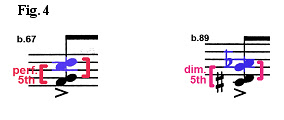
I think its purpose is to prepare the listeners since this colour element is again found in bar 20, particularly in the chords of the piano part (between notes D & Eb, A & Ab) and also in the yangqin part (where D and C# is again revealed in the 3rd beat).
Perhaps harmonically, this minor 2nd interval (or semitonal idea) could also be linearly connected in terms of voice leading, for instance the descending minor 2nd from Eb – D – C# (in the piano part from bs. 20-22 and also in the 2nd voice of the yangqin part at bar 20 if seen as a compound melody). Another set is Ab – G – F# in the upper voice of the yangqin part in bar 20.
Monday, June 18, 2007
agony
Saturday, June 16, 2007
pleasant experience
Friday, June 15, 2007
| You Are From Neptune |
 You are dreamy and mystical, with a natural psychic ability. You love music, poetry, dance, and (most of all) the open sea. Your soul is filled with possibilities, and your heart overflows with compassion. You can be in a room full of friendly people and feel all alone. If you don't get carried away with one idea, your spiritual nature will see you through anything. |
Thursday, June 14, 2007
watch the FUN!
Saturday, June 02, 2007
*gasps*
Sunday, May 27, 2007
Saturday, May 26, 2007
blue skies
Friday, May 25, 2007
CLiburN mAnia.. catch it LIVE
Interested people can register free online to catch a live webcast concert on Friday, May 25, 2007 at 6:00 p.m. CT featuring Michael Hawley, co-first-prize winner of the 2002 International Piano Competition for Outstanding Amateurs. (in singapore time i think is tomorrow afternoon..)
http://www.cliburn.org/index.php?page=webcast_concert
Appetizer
Rameau-Godowsky: Sarabande in E major
Lully-Godowsky: Sarabande in E minor
Bach-Hawley: Fugue in G major “Gigue”
Bach-Hawley: Passacaglia & Fugue in C minor
Entree
Chopin:Prelude in C-sharp minor, Op. 45
Barcarolle in F-sharp major, Op. 60
Etude in E minor, Op. 25, No. 5
Godowsky: Study No. 34 (based on Chopin's Etude, Op. 25, No. 5)
New Etude in A-flat major, No. 3
Godowsky: Study No. 45 (based on Chopin's New Etude No. 3)
Dessert
Moszkowski-Volodos-Hawley: Etincelles, Op. 36, No. 6
Saint-Saëns/Godowsky: The Swan (from Carnival of the Animals)
Dohnanyi: Capriccio in F minor, Op. 28, No. 6
Berlin-Tatum: Blue Skies
Saturday, May 19, 2007
Musique pour TouJours
Wednesday, May 02, 2007
finite maths... where n0thing is finite
Think the all-math weeks really changed how my brain works.. sleep halfway also suddenly have math probs surfacing and formulas flashing... even simple probs from everyday life i see myself applying pigeonhole principle.. hope it's not a sign of me going bonkers
Wednesday, April 25, 2007
Yellow River
The Yellow River concerto has always been one of my favourite piece, but it is hard to find performers that can actually bring out its underlying significance and majesty
It was adapted from Xian Xinghai’s “Yellow River Cantata” in 1940… The Yellow River is seen as a persistent musical theme and also a metaphor for China – praising the glorious history of the Chinese nationality (zhonghua minzhu) and the persistent struggling spirit of the Chinese citizens; it bitterly criticizes the cruelties of the oppressors and the torment suffered by the Chinese people. Hoping to nourish a sense of belonging and concern, nationalists pulled on the nation’s musical heartstrings. According to Ellen Judd, in China’s cultural redefinition in the 1940s, the performing arts offered the peasantry a “persuasive presentation of a new conception of the world” (Judd 1986, 31). Think the period when this cantata was composed coincides with Mao Zedong’s 1942 Yan’sn Talks on Literature and Art stating the central principle that art should be based on, reflect, and serve “the people”.
I finally found a video of this Yellow River concerto performed in the 70s in China.. I thought the pianist did wonderfully in portraying the underlying musical significance…the historical, political and economical significance. He really has the fire when he plays.. must watch k.. hope you guys will be inspired too!!
1st movt.: Yellow River Boatman’s Song
http://www.youtube.com/watch?v=uopB0QCgEqw
2nd movt.: Ode to the Yellow River
http://www.youtube.com/watch?v=IfdOyOb0Lr8&mode=related&search=
3rd movt.: Wrath of the Yellow River
http://www.youtube.com/watch?v=gau1pYEhfz8&mode=related&search=
4th movt.: Defend the Yellow River
http://www.youtube.com/watch?v=HK2PyFKh2Ao&mode=related&search=
Anyone knows who is that guy on the portrait at the background can let me know? he dosent look like Mao.. this portrait was captured in the performance of the 4th movt.
Thursday, April 12, 2007
Rach's 3rd
I heard Rachmaninov and he himself played it without (or with very subtle) pedal, as can be discerned by that 'dryness' in his recording... but i wonder why? with pedal the effect could be better and achieved with much less effort... perhaps he desired for that clarity? or maybe the presence of orchestral accompaniment (esp the winds and brass inst.) to a certain extent helped mask that dryness so it is ok it dosent sound so connected between the massive chords?
Oh and Van Cliburn's rendition of the Liszt Hungarian Rhapsody no. 12 was awesome!! It must have been a sensation for those watching him live.. Am sooo excited after watching this that I dont think I will fall asleep anytime soon... haha.. Great performances are always a pleasure to one's senses... Anyone interested can go to http://www.youtube.com/watch?v=KAqA2E5D0lI
Saturday, March 31, 2007
'Phoenix' Concerto - Structural Influences
However in this piece, it seemed to have achieved a combination of artistic effect from both the Western and Chinese tradition. Cos I read in some Chinese music text, they have this very conventional structural feature which they termed as “鱼咬尾”, which is found in this piece as well, as far as I can see. For illustrations, see bar 43, which signals the closing of section ‘a’ but the beginning of section ‘b’; bar 67 which is indicates the end of b section but also the beginning of a1. This continues at many junctions where one section leads in to another,thus in a sense contributing to the fluidity and link throughout the piece.
Interestingly we see from here how the composer draws upon features from chinese musical tradition and infuse it within the western formal structure.
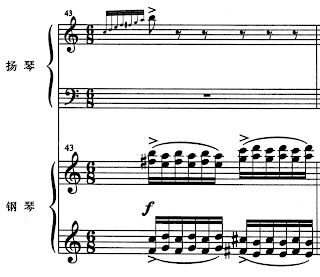
Monday, March 19, 2007
'Phoenix' Concerto - Motivic “Paradidle”
It’s amazing how the main theme of section B is only based on the ordering of 4 note motif - ‘B’, 2 ‘E’s of different registers and ‘A’. Hence in a sense, it's like ‘paradidle’ in percussion since it essentially uses the various permutation of the 4 notes to actually spun a melody. (Note: I termed it 'paradidle' is because of the piece’s percussive nature and how such motivic ordering may be associated to the paradidle, but of course it is not to be taken literally). Sometimes the introduction of B flat and E flat might possibility be to create surprise or to create some voice leading tendency, to propel the music forward…
See how B flat leads to A in the diagram below:
This melody is always set over a submediant pedal, quite uncommon eh since we often encounter tonic or dominant pedal.. but submediant!


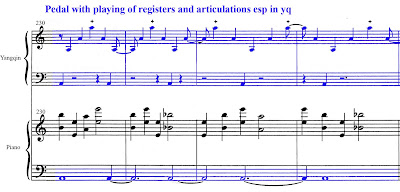
Sunday, March 18, 2007
'Phoenix' Concerto - Harmony
- Contribute to the more pentatonic nature of the work – creating a perfect 4th (a very characteristic interval found in Chinese classical music) instead of a tritone with ‘B’
- Due to the anhemitonic scale used, to avoid creating a semitone with note ‘E’ (linear thinking). Because it seems that throughout section A, the composer consciously avoids consecutive semitonal movement within the same voice.
- F# increases the note tendency to go to a G, which finally came at bar 5.

As mentioned above, the composer seemed to avoid successive semitonal movement within the same voice in section A. When chromatic movement is used, there are also notes in between to separate it. (see below for the chromatic voice leading)
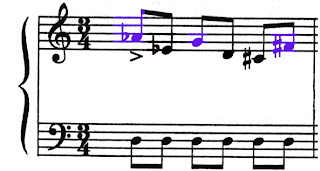
I notice that there is abundance of open 5ths and octaves (e.g. bs. 9, 43) apart from 4ths, which would have caused the piece to sound very bare, like The Sunken Cathedral by Debussy. Although both pieces are pentatonic in nature and filled with such open intervals, the atmosphere created is quite different – This concerto (esp. section A) do not sound as hollow as that felt in The Sunken Cathedral and it is interesting that we as listeners do not feel the awkwardness such bareness in this piece. Perhaps it is how the composer managed to ‘mask’ the bare sounding chords through the choice of registers..? Notice how the spacing between L.H. and R.H. were very close together (e.g. b. 117, 338 – R.H. octave is like an ‘echo’ of the L.H.).
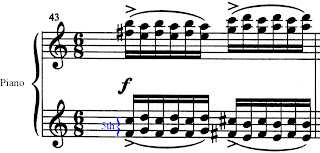
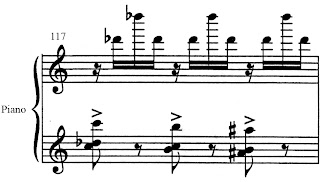
Sometimes even though the instruments are playing octaves in unison, for instance at bar 274 – 284, with range that spanned 3 octaves, the texture created is dense, not thin and empty. The spacing of chords, fortissimo and the quick tempo might be some contributing factors.
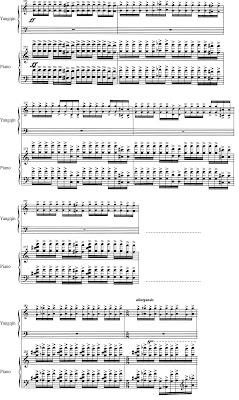
Saturday, February 17, 2007
'Phoenix' Concerto - Of Rhythmic and Pulse Interest
Of course, the use of syncopations in Chinese music is not uncommon, especially for accompaniment but it is actually quite rare to actually find such extensive use of syncopations for the melody. Instances can be heard at 0’20 – 0’30; 0’43 – 0’51 etc. (see diagrams for illustrations)

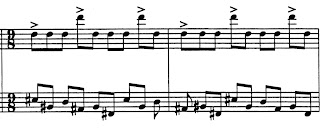
Right from the beginning (0’00 – 0’15), the subtle change in time signature from 6/8 passing through 2/4 before going to 3/4 made the transition in meter smooth. (i.e. 6/8 and 2/4 both can be sub-classified into 2 groups, except that 6/8 consists of groups of 3 quavers while 2/4 consists of groups of 2 quavers. Leading in to 3/4 from here would not upset the metrical feel too much).
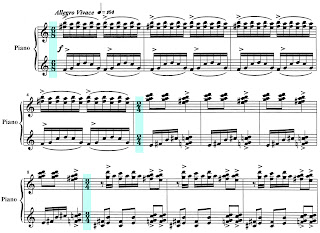


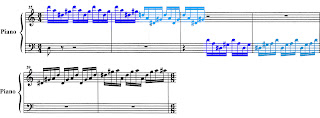
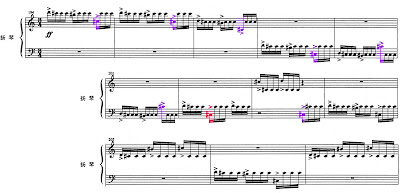
I also found instances where the perceived meter is not what was stated in the score, due to the rate of harmonic change and phrase structure that conflicts with the actual time signature. One example would be the middle section, 6’02 – 6’54 or a more decorated version from 7’48 – 8’40.
The main accompanimental figuration was also ingeniously ‘tampered’ with so that its recurrence is not always exactly the same. Although it was only altered from 6/8 to 5/8, but I feel that such little variation actually added variety to the already interesting music. (Compare between 0’59 – 1’05 and 1’28 – 1’33)
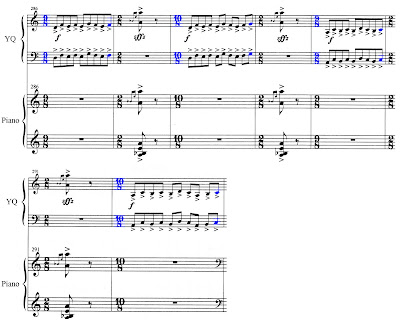
'Phoenix' Concerto - Rhythmic Influences from Opera
So, I’ve spent some time delving into this aspect which is not very familiar to me and managed to identify a few main patterns. It was an eye-opener for me as I have seldom come across such specific percussive rhythmic patterns being infused in a melodic instrument; much less provide a rhythmic structure for the music.
Ø Bars 9 - 12 (0’11 – 0’15) resembles the rhythm “ 3/4 [乙才] [乙台] 匡” ([yi cai] [yi tai] kuang) also termed as “马腿儿” (ma tui er) rhythm unique to opera music.
N.B. [ ] represents quaver because this blog dosent support e underline format
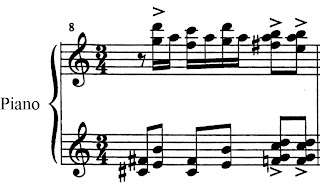

Thus in a sense, the competitive atmosphere brought from the previous A section between the yangqin and piano could be viewed as an ‘overture’ for the main theme of section B.
Friday, February 16, 2007
'Phoenix' Concerto - Structure, Melodic element
Section A: Bars 1 – 213 (0’00 – 5’06)
Section B: Bars 214 – 343 (5’07 – 12’56)
Section A’: Bars 344 – 417 (12’57 – )
Under each of the 3 sections, it can further be classified into smaller segments according to the various melodic ideas as shown below:
(Timings are shown below the melodic fragments)
Here, the theme is introduced by the piano for the first 8 bars, followed by a repetition of the exact same theme by the yangqin. It is actually quite difficult for yangqin to produce such expressive sounds since it’s often considered a percussive instrument, but it is remarkable how the composer uses the rare 9 single stroke roll technique to give listeners an illusion of ‘a line connected by dots’.
Within each section, the various little melodic fragments unique to that section are constantly brought back, sometimes with modifications and sometimes without. I suppose it is because the melodic fragments in this concerto are neither singable nor could easily be remembered, given its characteristic clashes and dissonant leaps all over especially in the first section. So there is a need to constantly reiterate these ‘points’. Or perhaps it is also something to do with Chinese opera influences? – where each melodic fragment represents a character in the plot..
But generally, I notice that the extent of exploration or development of the melodic fragments is quite little. Most of the time, it is repeated in its original form, which in a sense makes it easy to recognize… Perhaps that’s why the piece is full of rhythmic excitement, and many different melodic ideas to make up for the lack of thematic development.
Thursday, February 01, 2007
Thursday, January 25, 2007
凤点头 (The ‘Phoenix’ Concerto)
This concerto was composed in 2003 by Prof. Xu Chang Jun (徐昌俊) from Central Conservatory of Music in China. It was written for the yangqin, accompanied by the string ensemble with 6 violin I, 4 violin II, 3 viola, 3 cello and 2 bass. But what I have is the reduced score accompanied by the piano.
It was after I had gone for yq lessons for this piece did I realize that it was actually infused with lots of elements found in Chinese opera music, especially in terms of its character. Chinese opera can generally be divided into "civil" pieces characterized by singing, and "martial" ones featuring acrobatics and stunts. This concerto belonged to the latter, hence explaining its percussive and virtuosic nature. 凤点头 was actually the name of a particular type of drumming pattern often found in opera music, therefore if we were to listen carefully, we could actually pick out these patterns that were embellished inside the music.
I’ll be examining in my following postings, certain aspects of this piece that differentiates it from the usual Chinese classical piece that we often hear.
At first listening, this piece does not sound exactly Chinese; this was probably due to some 20th Century Western compositional techniques/ elements that were incorporated together with Chinese elements, especially in terms of harmony and rhythms. This concerto has often been acclaimed as a mix of the East and West from what I have heard which I hope to examine why is it so and also the contributing factors that bind the piece together.
The element of contrast is also quite prominent in this piece, hence I would also be delving into this area.
I have uploaded a very low resolution video clip for this concerto (performed by me during a practice session before the finals.. haha), it may take quite some time to load. The sound quality is also not very good. If any of you prefers a clearer version pls let me know so I can lend the vcd to you :D
This clip can be accessed via http://sg.geocities.com/yickjr/
Friday, January 12, 2007
will i survive?
Monday, January 01, 2007
Hail to 2007!
This is going to be another busy year for us.. Ah!! school is reopening in 6 days time and we shall be subjected to more stress and hours of mugging soooon..
haha so lets savour our last wk of holiday and take a deep breath before we start our 'endless' race of meeting deadlines
